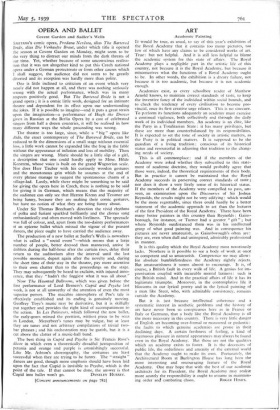OPERA AND BALLET
Covent Garden and Sadler's Wells
SMETANA'S comic opera, Prodana Nev'esta, alias The Bartered Bride, alias Die Verkaufte Braut, under which title it opened the season at Covent Garden on Monday, might seem to be the very thing to distract our minds from the dark threats of our time. Yet, whether because of some unconscious realisa- tion that it was not altogether kind to put this Czech national opera under a German protectorate or from other causes which I shall suggest, the audience did not seem to be greatly diverted and its reception was hardly more than polite.
One is little inclined to criticism of an event which very nearly did not happen at all, and there was nothing seriously wrong with the actual performance, which was in many respects positively good. But The Bartered Bride is not a grand opera ; it is a comic little work, designed for an intimate theatre and dependent for its effect upon our understanding the jokes. If it is possible to imagine—and it puts a great strain upon the imagination—a performance of Hugh the Drover given in Russian at the Berlin Opera by a cast of celebrated singers from half a dozen countries, it will be realised in how many different ways the whole proceeding was wrong.
The theatre is too large, since, while a " big " opera like Aida, the exact contemporary of The Bartered Bride, can be reduced to fit the dimensions of a small stage without essential loss, a little work cannot be expanded like the frog in the fable without the appearance of inflation and loss of mobility. Then the singers are wrong. Marie should be a little slip of a girl, a description that one could hardly apply to Mme. Hilde Konetzni, whose voice is built on the grand Wagnerian scale. Nor does Herr Tauber with his curiously wooden gestures and the monotonous grin which he assumes at the end of every phrase manage to suggest the spontaneous charm of a village-lad. Lastly, while there might be something to be said for giving the opera here in Czech, there is nothing to be said for giving it in German, which means that the majority of the audience can only see that Herren Krenn and Tessmer are being funny, because they are making their comic gestures, but have no notion of what they are being funny about.
Under Sir Thomas Beecham's direction the vivid rhythms of polka and furiant sparkled brilliantly and the chorus sang enthusiastically and often moved with liveliness. The spectacle was full of colour, and, apart from the too-dainty performances of an epicene ballet which missed the vigour of the peasant dances, the piece ought to have carried the audience away.
The production of a new ballet at Sadler's Wells is nowadays what is called a " social event "—which means that a large number of people, better dressed than mannered, arrive in driblets during the half-hour after the curtain rises, delay their return to the auditorium after the interval until the last possible moment, depart again after the novelty and, during the short time of their stay in the theatre, pay more attention to their own chatter than to the proceedings on the stage. They may subsequently be heard to exclaim, with injured inno- cence, that they " hadn't the foggiest what it was all about."
Now The Haunted Ballroom, which was given before the first performance of Lord Berners's Cupid and Psyche last week, is not at all unworthy of the attention of even the most superior person. The macabre atmosphere of Poe's tale is effectively established and its ending is genuinely moving. Geoffrey Toye's music may be derivative, but it is skilfully put together and provides the right kind of accompaniment to the action. In Les Patineurs, which followed the new ballet, the early-goers missed the prettiest, wittiest piece to be seen in London. Meyerbeer's tunes may be vulgar, but at least they are tunes and not arbitrary compilations of trivial two- bar phrases ; and his orchestration may be garish, but it is a cut above the clatter of a music-hall band.
The best thing in Cupid and Psyche is Sir Francis Rose's decor in which even a theoretically dreadful juxtaposition of petunia and orange and purple is astonishingly successful. Like Mr. Ashton's choreography, the costumes are least successful when they are trying to be funny. The " straight " dances are good, though more emphasis should have been laid upon the fact that Cupid is invisible to Psyche, which is the point of the tale. If that cannot be done, the answer is that [Concert announcements on page 782]














































 Previous page
Previous page